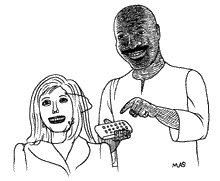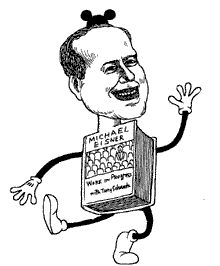
Movies
Holy Man (Buena Vista Pictures). Critics are disappointed by Eddie Murphy's turn as a spiritual guru who is discovered by a TV executive and ends up hawking gadgets on a 24 hour cable shopping channel. The film "wants to say something about the commodification of spirituality, but has no idea what" (Rod Dreher, the New York Post). Treading ground previously trod by Being There, Network, and Forrest Gump, the screenplay doesn't give Murphy a chance to flex his comedic muscles, and the result is weak satire. (Visit the official site.)
The Mighty (Miramax Films). The second handicapped-kid friendship story of the season (after Simon Birch) hits the mark. Kieran Culkin and Elden Henson star as 14-year-old outcasts--the former a whip-smart bookworm with a degenerative bone disease, the latter a hulking giant who has been held back in school two years running. With Culkin on Henson's shoulders, the pair is able to outwit neighborhood bullies and to overcome personal obstacles. Although a few critics find it too heavy with "only-in-the-movies claptrap" (Owen Gleiberman, Entertainment Weekly), most praise the film because "it never slides down that slippery slope of sap that you keep expecting" (Jami Bernard, New York Daily News). (Find out about the young-adult novel that is the basis for this film.)
Slam (Trimark Pictures). After snagging the grand prize at Sundance and the best first film prize at Cannes, this fable of the redemptive power of poetry wins more praise in its general release. Although critics detect shaky spots, they find the film "stirring, powerful, and thrilling," and call veteran poetry-slam champion Saul Williams' performance as a drug dealer/poet "eerily beautiful" (Joe Morgenstern, the Wall Street Journal). USA Today's Andy Seiler disagrees: "The movie drowns in self-indulgence and earnest speechifying." (Here is a page of links to slam poetry sites.)
A Night at the Roxbury (Paramount Pictures). As Saturday Night Live skits-turned-movies go, this one "makes TheBlues Brothers look like Kurosawa" (Susan Wlosczyna, USA Today). A three minute skit about two pathetically eager "delusional poseurs" (Tamara Ikenberg, the Baltimore Sun) who'll do anything to get into the Roxbury nightclub, is now an hour and a half of the same, which wears thin by the end. Funny cameos, though, by Loni Anderson and Richard Grieco (who plays himself). (Read a parody of the movie's script here.)
Dance
Swan Lake (Neil Simon Theatre, New York City). Choreographer Matthew Bourne's re-engineered "gay Swan Lake" played for six months in London (the longest continuous run of any ballet there) and eight weeks in Los Angeles and is now basking in critical acclaim on Broadway. Gripping storytelling and an ingenious use of men in feathers are the most praised elements of the production. Despite radical changes to the story line, critics note that both the score and the ballet's sense of magical fantasy remain virtually unchanged. John Simon (New York), dissenting, calls the production "choreographically impoverished" and advises Bourne to "[g]o jump in a lake." (Visit the ballet's Web site.)

Books
Work in Progress, by Michael Eisner with Tony Schwartz (Random House). One word crops up in almost every review of the Disney CEO's "riches-to-riches autobiography" (Ty Burr, Entertainment Weekly): "bland." Even the swipes Eisner takes at archenemies Jeffrey Katzenberg and Michael Ovitz are mild. The one shocker in the book is the revelation of Eisner's heart-and-soul belief that those who criticize Disney simply don't understand it and that "the company's good is unquestionably, inextricably intertwined with the larger social good" (Richard Schickel, the Los Angeles Times). (For the biography of another "awkward, toothy, curious, and good-spirited Everyman" at Disney, read Goofy's official bio. And Mark Crispin Miller and Tim Ferguson discuss the book in Slate's "Book Club.")
Pure Drivel, by Steve Martin (Hyperion). This "spankingly inventive" (Brett Kelly, New York) collection of humorous essays (most of which originally appeared in The New Yorker) puts Martin back in the comic pantheon after a recent series of disappointing films. The titles alone--"Mars Probe Finds Kittens" and "Schrödinger's Cat" (which covers "Sacajawea's Rain Bonnet" and "Wittgenstein's Banana")--display Martin's knack for goofy parody. Critics call the slim volume lighter than air but "giddy with imagination, exuberance, and originality" (Maureen Corrigan, Newsday). (Find out more about the book on Amazon.com.)
Recent "Summary Judgment" columns
Movie--Antz;
Movie--What Dreams May Come;
Movie--Happiness;
Book--I Married a Communist, by Philip Roth;
Television--The Secret Diary of Desmond Pfeiffer;
Art--"Van Gogh's Van Goghs: Masterpieces From the Van Gogh Museum, Amsterdam."
Movie--Ronin;
Movie--Urban Legend;
Book--Two Cities, by John Edgar Wideman;
Opera--A Streetcar Named Desire;
Music--Painted From Memory, by Elvis Costello with Burt Bacharach;
Television--Felicity;
Art--"From Van Eyck to Bruegel: Early Netherlandish Painting in the Metropolitan Museum of Art."
Report--The Starr Report;
Book--Bag of Bones, by Stephen King;
Book--Model Behavior, by Jay McInerney;
Book--Birds of America, by Lorrie Moore;
Movie--Rush Hour;
Movie--Permanent Midnight;
Movie--A Soldier's Daughter Never Cries.
Movie--Rounders;
Movie--One True Thing;
Movie--Simon Birch;
Movie--Touch of Evil;
Book--Anne Frank, by Melissa Müller;
Music--Mechanical Animals, by Marilyn Manson;
Music--Teatro, by Willie Nelson.
--Eliza Truitt